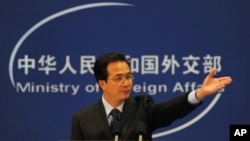Beijing officials reaffirmed China's commitment to the euro currency and the European economy as uncertainty grows over whether E.U. officials can quickly recover from their debt crisis.
In a statement to reporters, Foreign Ministry spokesman Hong Lei said he hopes Europe has the ability and wisdom to overcome its debt crisis and ensure the safety of Chinese investments.
Approximately 25 percent of China's huge $2.8 trillion foreign exchange reserves are invested in euro-dominated assets, making Beijing vulnerable if the currency declines.
While some analysts say China must stay the course despite deepening crisis in member states such as Italy and Greece, others say the crisis is speeding China's efforts to expand economic footholds inside Europe.
"Europe's crisis is becoming China's opportunity," said Jonas Parello-Plesner, one author of a report released this week by the European Council on Foreign Relations that suggests China is capitalizing on the crisis by striking cut-price procurement deals and buying the public debts of deficit ridden European countries.
"We used to see economic opportunities in China for Europeans with cheap exports, but now it is China present in Europe in a totally different way," he said. "We see it in the pile up of European government bonds; we see it in ailing industries; and we see it with public infrastructure, where China is building new roads and linking Europe in new ways."
The report also points to China's particular interest in Europe's high-tech resources -- especially so-called green technologies.
Calls for a level playing field
Parello-Plesner said China's investment level is rising fast and by 2015 its investments in Europe will exceed Europe's investments in China, a growing concern among member states who say Beijing is not allowing European companies an equal footing in China.
"We need to have access to public infrastructure so we can build highways in China if they buy highways in Europe," said Parello-Plesner, explaining that European leaders must unite behind a demand for what he describes as a rule-based level playing field for European businesses.
Similar calls for China to allow greater access to high-tech and infrastructure projects were made this week by the U.S. Ambassador to China Gary Locke.
Waxing political influence
Alice Richard, a China analyst with the European Council on Foreign Relations, says China is expanding its political influence along with its economic clout. While Beijing’s mission to the E.U. in Brussels rarely used to engage with the diplomatic community and issue statements on China’s core interests, she said, its soft-power strategy in the region is winning over some of Europe's political elites.
"They're present at every think-tank meeting, at every single European parliament hearing, and they engage on a completely different basis," said Richard. "They are much more willing to discuss issues and they come better equipped. They know Europe inside out."
Richards says the Chinese studied the intricate details of the recent London riots and supported the British Prime Minister's remarks about controlling social media to contain public debate.
"They understand us better and from [the riots] they will have a better understanding on how to influence opinions in Europe."
Wariness and desperation
While many in Europe remain wary of the motivations and fallout from China’s financial bail-outs, Richards says Beijing is still finding desperate countries eager for assistance.
This week, Beijing announced it was loaning broke Belarus, a non-E.U. member, $1 billion for work on joint projects in the country.
Chinese foreign ministry spokesman Hong says the countries are engaged in cooperation across the board and on the basis of mutual benefit on an equal footing.
What he didn't mention was that Belarus supports Beijing in its policies towards Taiwan, Tibet, and Xinjiang and on human rights. Such political support is less-likely from E.U. members Greece and Italy, despite their deepening economic problems.
Europe's Debt Woes Pose Opportunities for China












